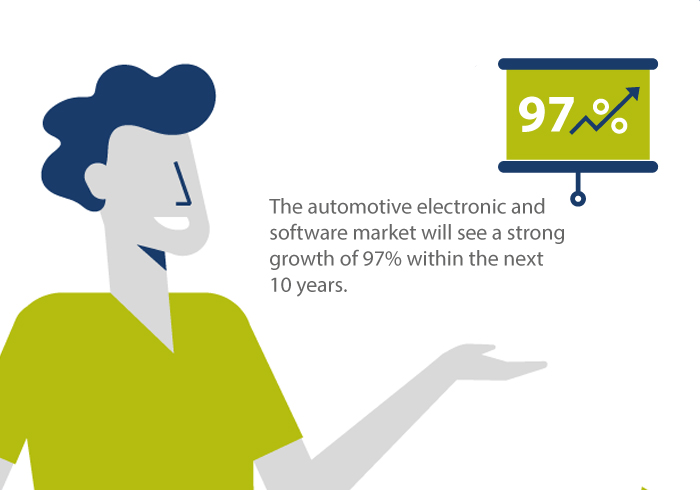
Ms. Martina Waldner
Senior Program Consultant
info ∂does-not-exist.hectorschool com
+49 721-608-48075
Reap the benefits of expert knowledge on advanced driver assistance systems (ADAS) in technological focus topics, combine focal points and become an universal ADAS specialist. Join our comprehensive qualification courses in advanced driver assistance systems to fully understand autonomous and semi-autonomous automotive systems and the challenges facing intelligent systems. Experienced professors will share their insights on future technologies covering cutting-edge topics. Gain hands-on expertise in our platooning workshop to experience the latest in mobility concepts while learning to integrate software to control vehicle systems - Experience how to set up an autonomous test ride.
„Advanced Driver Assistance Systems (ADAS) play an integral role in shaping the future of mobility system technologies. ADAS features improve traffic safety, efficiency, and comfort. Slip into the driver's seat and familiarize yourself with ADAS functions, components and technologies to open yourself to boundless new professional opportunities.”
Prof. Dr. rer. nat. Frank Gauterin
Comprehensive Understanding of ADAS in 10 Courses of each 2 days
As an ADAS course participant, you will benefit from the systemic and holistic approaches our experienced lecturers implement when teaching ADAS. Tailor your experience to meet your individual needs by selecting from five courses focusing on the functions of advanced driver assistance systems. Widen your skill set by selecting from an additional five courses focusing on the ADAS components and technologies.
Driver Assistance Systems
Master the functions and technology at the forefront of modern driver assistance systems. Course participants are expected to develop a nuanced understanding of the sensors and systems that contribute to comfort and security provided by modern solutions. Background courses in statistics and legal requirements will provide you with a comprehensive toolkit to approach any challenge in working with modern ADAS technologies. Delve into adjacent topics such as: vehicle stabilization, braking systems, steering support, and passenger protection technologies to maximize protection, comfort, and utility. Join your fellow course participants and envision a comprehensive networked vehicular movement and safety system.
Auto Control Systems
Course participants will learn more about autonomous mobile robot architectures, semi-automatic assistant systems, information-gathering methodologies, and how to handle uncertainty. You will learn to apply your skills to practical, real-world, situations allowing the vehicle to think and react dynamically. Join your fellow course participants and innovate revolutionary approaches to mobility.
Driveability
Approach methods for analysis and evaluation of vehicle behavior and acquire a deeper understanding in the planning and implementation of physical and virtual vehicle behavior tests. Before a vehicle ready for the road, it must fulfill several economic and technical performance standards. Even further requirements must additionally be met for a successful market launch. Course participants will investigate the interaction of the vehicle in itself as well as its interaction with the environment around it. The drivability will be evaluated within the framework of the product development process.
Traffic Engineering and Control
A single vehicle is a part of a larger collective as a cog in the larger stream of traffic. Course participants will learn more about the macro and micro characteristics dictating traffic flow and traffic control systems. Test and use tools to model simulations of traffic flows and larger traffic infrastructures. Practical applications will show differences and interaction potential of individual vehicles in traffic flows as best seen in control measures (i.e. signals and non-signal intersections).
Car-to-X Communication
Acquaint yourself with the technical elements and scientific challenges in car-to-car and car-to-infrastructure communication systems. Learn more about applications, system requirements, and security elements as your lecturers apply standardized system architectures to solve the challenges faced in car-to-X communication. Immerse yourself in the techniques needed to increase traffic safety and efficiency.
Automotive EMC Technology
It is well known that automotive radar systems make a significant contribution to traffic safety and driving comfort. Learn more about the variety in automotive radar applications and their technical components as well as the challenges facing their design and operation. Course participants will familiarize themselves with the methods used for target detection, tracking, and avoidance of radar interference. Put your newly acquired knowledge to the test in an active laboratory.
Automotive Lightning
Learn the basics of automotive lightning and electromagnetic (ELM) sensors and experience how to prepare the information for assistance functions, including adaptive headlamp systems. Learn more about the interconnection between sensing and acting to enable automatic driver support. Course participants will evaluate different human-machine interaction methods and develop improved safety systems for future lighting systems.
Mobile Perception Systems
Learn about the importance of video and optical perception systems for vehicle safety, comfort, and efficiency. Course participants will learn about the strengths and weaknesses of radar, lidar (light detection and ranging), and vision sensors in scene reconstruction, and quantify uncertainties to discuss information differences in mono- and stereoscopic camera systems. Explore specific methodologies for environmental perception through practical examples and applications. Gain an outlook towards applications in driver assistance systems and automated driving.
IT Safety and Security
Understand the basics of cryptographic techniques in IT security and develop the skills to discuss complex security applications. Learn to apply different models and methods from computer security and to evaluate security protocols and given systems. With the ability to understand security leaks and to deconstruct conventional solutions, course participants will develop the mindset needed for successful work in IT security.
Hands-on Training „Platooning“
Take part in this case study to analyze the draft process of electronic systems and learn how to integrate components and functions of autonomous driving. Apply the methods and tools of model-based analysis and the draft and inspection procedures for hardware and software. Course participants will develop a prototype that is responsible for controlling a platoon of vehicles. At the end of the course, participants will develop a vehicle capable to drive autonomously following a lead.
Key Facts:
- Orientation: Small International and interdisciplinary groups from 5 to 25 attendees.
- Language: English; individual companies request for lectures in German can be considered.
- Location: Can be held on-campus at the HECTOR School or online. If on-campus: refreshments and snacks during the breaks; accommodation available.
- Costs: 850 EUR per 2-day course, min. 5 participants.
- Certificate: KIT and HECTOR School Certificate after participation. Exam and ECTS credits are available upon request.
Please contact our Program Consultants for further information, e.g. on prerequisites and exact dates of your preferred course.

Companies are enabled to accelerate the change process with a customized further education approach.
The targeted continuing education e.g. in digital transformation or alternative powertrains guarantees a high degree of reliability and a direct transfer into the company.
More Details
The world of employment is becoming more dynamic and complex. Businesses need to react to events more and more quickly. Find compact continuing education formats designed for professionals in the HECTOR School Academy.
Learn more about our courses



